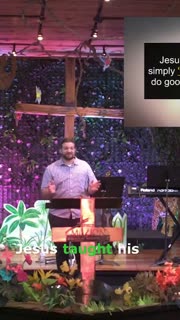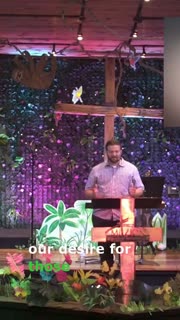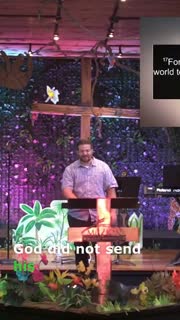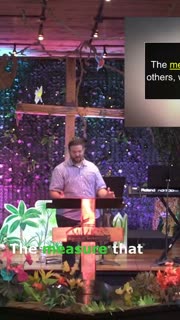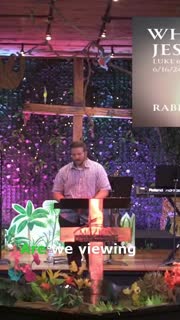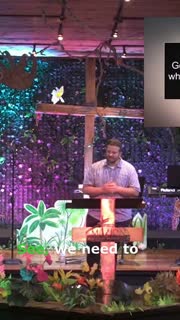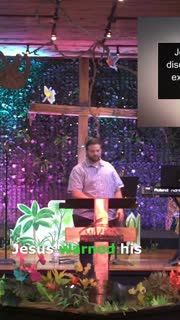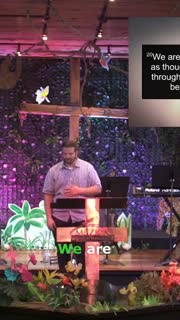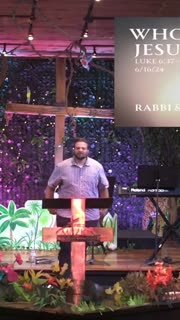Embracing Mercy: Loving Others Through Christ's Teachings
Devotional
Sermon Summary
Bible Study Guide
Sermon Clips
### Quotes for Outreach
1. "Jesus taught his followers to not simply tolerate their enemies, but to do good, bless, and pray for them. I don't know about you, but it would be a lot easier if Jesus said, tolerate your enemies. Tolerate those who persecute you. Like, just, you know, grit your teeth, just get through it. Like, you know, tomorrow's a new day. Like, no, he doesn't say simply to tolerate. He says to, it's an act of command. It's an action. It's to do good. It's to bless." (31 seconds)
2. "Our desire for those living in sin should be restoration, not condemnation. And we have to check our heart, church, because it's really easy for us to fall into the trap of wanting to look at the world and see them as our enemy and want them to be condemned, want them to face judgment." (18 seconds)
3. "God did not send his Son into the world to condemn the world but to save the world. But all who accept will be saved. But all who do not accept his words will be condemned. Again, it's this idea that Jesus came to save the world and if you accept what he said and if you accept what he did and you choose to live your life according to his word, you will be saved." (20 seconds)
4. "The measure that we use towards others will be measured back to us. You see, the text says judge not and you will not be judged. Forgive and you will be forgiven. And it goes on to say that whatever measure that you use towards others will be measured back to you." (21 seconds)
5. "Are we viewing our enemies through the lens of the world or through the lens of the cross? Are we viewing those who hurt us, those who have wronged us, those who are living in the world and have no regard for truth? Are we viewing those people through the lens of the world and how the world sees them? Or are we viewing them through the lens of the cross?" (24 seconds)
### Quotes for Members
1. "See, we need to be able to differentiate between what is good and evil, but your next point is this, Christians must be careful not to place judgment and condemnation on those living in sin. Again, what Jesus is saying is, is don't be like the Pharisees who they walk around day by day and they want to just place condemnation and judgment on someone. They want them to get what they deserve right now." (24 seconds)
2. "Jesus warned his listeners to discern if they were following his example or the example of the Pharisees. See, in verse 39 through 40, let's just read that again. He says he also told them this parable, can the blind lead the blind? Will they not both fall into a pit? The student is not above the teacher but everyone who was fully trained will be like their teacher. See, whose example are you following when it comes to how you treat those who mistreat you?" (33 seconds)
3. "Jesus encourages his followers to be more focused on identifying and removing their own sin rather than condemning everybody else's. Verse 41 through 44 of Luke chapter 6. Let's read that again. Why do you look at the speck of sawdust in your brother's eye and pay no attention to the plank in your own eye? How can you say to your brother, brother let me take the speck out of your eye and then you yourself fail to see the plank in your own eye?" (-1098 seconds)
4. "We are therefore Christ's ambassadors as though God were making his appeal through us. We implore you on Christ's behalf be reconciled to God. God made him who had no sin to be reconciled to be sin for us so that in him we might become the righteousness of God. Church how are you viewing people today? Are you viewing them through the lens of the world and you just want them to get what they deserve and you just you know they're very rightly probably wrong but what is the heart of Jesus to not view people through a worldly point of view but to view them to the cross that if anyone comes to Jesus God will make all things new for them." (49 seconds)
5. "Lord, we want to have your heart. Lord God, we want to be a church that builds everything we do upon your word, your word that doesn't change but God we also want to have a heart that loves people right where they're at because that's the place where transformation begins. Transformation begins where they're at and it begins to change as they surrender their lives to your word." (25 seconds)
Ask a question about this sermon
1. "Jesus taught his followers to not simply tolerate their enemies, but to do good, bless, and pray for them. I don't know about you, but it would be a lot easier if Jesus said, tolerate your enemies. Tolerate those who persecute you. Like, just, you know, grit your teeth, just get through it. Like, you know, tomorrow's a new day. Like, no, he doesn't say simply to tolerate. He says to, it's an act of command. It's an action. It's to do good. It's to bless." (31 seconds)
2. "Our desire for those living in sin should be restoration, not condemnation. And we have to check our heart, church, because it's really easy for us to fall into the trap of wanting to look at the world and see them as our enemy and want them to be condemned, want them to face judgment." (18 seconds)
3. "God did not send his Son into the world to condemn the world but to save the world. But all who accept will be saved. But all who do not accept his words will be condemned. Again, it's this idea that Jesus came to save the world and if you accept what he said and if you accept what he did and you choose to live your life according to his word, you will be saved." (20 seconds)
4. "The measure that we use towards others will be measured back to us. You see, the text says judge not and you will not be judged. Forgive and you will be forgiven. And it goes on to say that whatever measure that you use towards others will be measured back to you." (21 seconds)
5. "Are we viewing our enemies through the lens of the world or through the lens of the cross? Are we viewing those who hurt us, those who have wronged us, those who are living in the world and have no regard for truth? Are we viewing those people through the lens of the world and how the world sees them? Or are we viewing them through the lens of the cross?" (24 seconds)
### Quotes for Members
1. "See, we need to be able to differentiate between what is good and evil, but your next point is this, Christians must be careful not to place judgment and condemnation on those living in sin. Again, what Jesus is saying is, is don't be like the Pharisees who they walk around day by day and they want to just place condemnation and judgment on someone. They want them to get what they deserve right now." (24 seconds)
2. "Jesus warned his listeners to discern if they were following his example or the example of the Pharisees. See, in verse 39 through 40, let's just read that again. He says he also told them this parable, can the blind lead the blind? Will they not both fall into a pit? The student is not above the teacher but everyone who was fully trained will be like their teacher. See, whose example are you following when it comes to how you treat those who mistreat you?" (33 seconds)
3. "Jesus encourages his followers to be more focused on identifying and removing their own sin rather than condemning everybody else's. Verse 41 through 44 of Luke chapter 6. Let's read that again. Why do you look at the speck of sawdust in your brother's eye and pay no attention to the plank in your own eye? How can you say to your brother, brother let me take the speck out of your eye and then you yourself fail to see the plank in your own eye?" (-1098 seconds)
4. "We are therefore Christ's ambassadors as though God were making his appeal through us. We implore you on Christ's behalf be reconciled to God. God made him who had no sin to be reconciled to be sin for us so that in him we might become the righteousness of God. Church how are you viewing people today? Are you viewing them through the lens of the world and you just want them to get what they deserve and you just you know they're very rightly probably wrong but what is the heart of Jesus to not view people through a worldly point of view but to view them to the cross that if anyone comes to Jesus God will make all things new for them." (49 seconds)
5. "Lord, we want to have your heart. Lord God, we want to be a church that builds everything we do upon your word, your word that doesn't change but God we also want to have a heart that loves people right where they're at because that's the place where transformation begins. Transformation begins where they're at and it begins to change as they surrender their lives to your word." (25 seconds)
